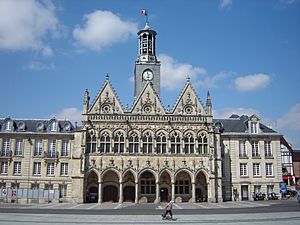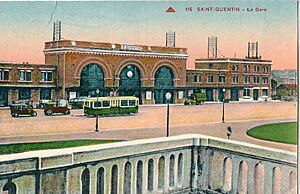Saint-Quentin, Aisne facts for kids
Quick facts for kids
Saint-Quentin
|
||
|---|---|---|
|
Subprefecture and commune
|
||
|
Town hall
|
||
|
||
| Country | France | |
| Region | Hauts-de-France | |
| Department | Aisne | |
| Arrondissement | Saint-Quentin | |
| Canton | Saint-Quentin-1, 2 and 3 | |
| Intercommunality | Saint-Quentin | |
| Area
1
|
22.56 km2 (8.71 sq mi) | |
| Population
(Jan. 2021)
|
Lua error in Module:Wd at line 1,575: attempt to index field 'wikibase' (a nil value). | |
| Time zone | UTC+01:00 (CET) | |
| • Summer (DST) | UTC+02:00 (CEST) | |
| INSEE/Postal code |
02691 /02100
|
|
| Elevation | 68–125 m (223–410 ft) (avg. 74 m or 243 ft) |
|
| 1 French Land Register data, which excludes lakes, ponds, glaciers > 1 km2 (0.386 sq mi or 247 acres) and river estuaries. | ||
Saint-Quentin is a town in northern France. It is located in the Aisne department. This department is part of the Hauts-de-France region. Saint-Quentin is also a commune. A commune is like a local government area in France.
The town has a very old history. In ancient times, it was called Augusta Veromanduorum. The name Saint-Quentin comes from Saint Quentin. People believe he was a Christian saint who died there in the 3rd century.
Contents
History of Saint-Quentin
Ancient Roots
Saint-Quentin has been an important place for a very long time. It was first settled by a group of people called the Viromandui. They were a tribe in ancient Gaul, which is now France. The Romans later built a town there. They named it Augusta Veromanduorum. This means "Augusta of the Viromandui."
The Name Saint Quentin
The town's current name comes from Saint Quentin. He was a Roman citizen who became a Christian. Stories say he traveled to Gaul to spread Christianity. He was captured and died for his beliefs in the 3rd century. People built a church over his tomb. This church later became the famous Basilica of Saint-Quentin.
Exploring Saint-Quentin
Important Buildings
Saint-Quentin has many interesting buildings. The
Town Hall is a beautiful building. It shows the town's rich history and architecture. It is a central point in the town.
The Basilica of Saint-Quentin is another famous landmark. It is a large church with a long history. It has been repaired many times over the years. This includes after damage from wars.
Daily Life and Transport
The town has a lively market. People gather there to buy and sell goods. It is a busy and important part of the town.
Saint-Quentin also has a railway station.
This station connects the town to other parts of France. It makes travel easy for residents and visitors.
People from Saint-Quentin
Many interesting people have connections to Saint-Quentin. One example is Félix Davin. He was a French poet and journalist. He lived in the 19th century. People like Félix Davin helped shape the culture of the town.
See also
 In Spanish: San Quintín (Aisne) para niños
In Spanish: San Quintín (Aisne) para niños
Images for kids
-
Ruins in Saint-Quentin, France during the First World War.
 | Claudette Colvin |
 | Myrlie Evers-Williams |
 | Alberta Odell Jones |












